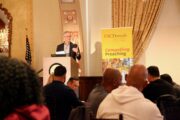There’s an interesting article in the Sports section of the New York Times (August 2, 2009) on several X Games competitors who have given up life in the fast lane, of (apparently) sex, drugs and rock and roll, and have converted to Christianity of an evangelical sort. But don’t think that these new Christians have somehow tamed their desire for living on the edge. As freestyle motocross rider and X Games competitor Brian Deegan says, “Who’s more radical than us? Everything we do is full-on. Once we went to church, we were full-on Christians, too. And we’re going to go for it.”
I first became aware of these sorts of developments within Christian churches and para-church organizations a few years ago while doing research for our book, Finding Faith: The Spiritual Quest of the Post-Boomer Generation (2008, Rutgers University Press). We called this expression of Christianity “Appropriators” because they are so good at reading the larger culture and then appropriating the music, sports, t-shirts, bumper stickers, etc., and then creating programs and products that look almost identical to that found in popular culture, albeit with a nice Christian gloss. Here’s some of what we wrote about Appropriators:
“[Appropriator] programs, music, bookstores, cafes, clothing, and the experiences they produce mirror what is available outside of Christian circles, and despite the Christian content, it all ends up pretty much like everything else in American popular culture. As a result, it becomes both cool and relatively unobtrusive to be a Christian. In this, Appropriators have created a form of consumer Christianity where one can wear their identity through a T-shirt, bumper sticker, or tattoo, have coffee at their church cafe, and have what amounts to Christian vacations, all without really giving up any part of an American middle-class consumer lifestyle.”
Lately some of the groups that we framed as Appropriators have been working on their own designation as “Innovative.” Maybe just another move to appropriate something going on in the larger culture!
But hey, read the article, then read our book and let me know what you think.
Richard Flory is the executive director of the USC Center for Religion and Civic Culture.









